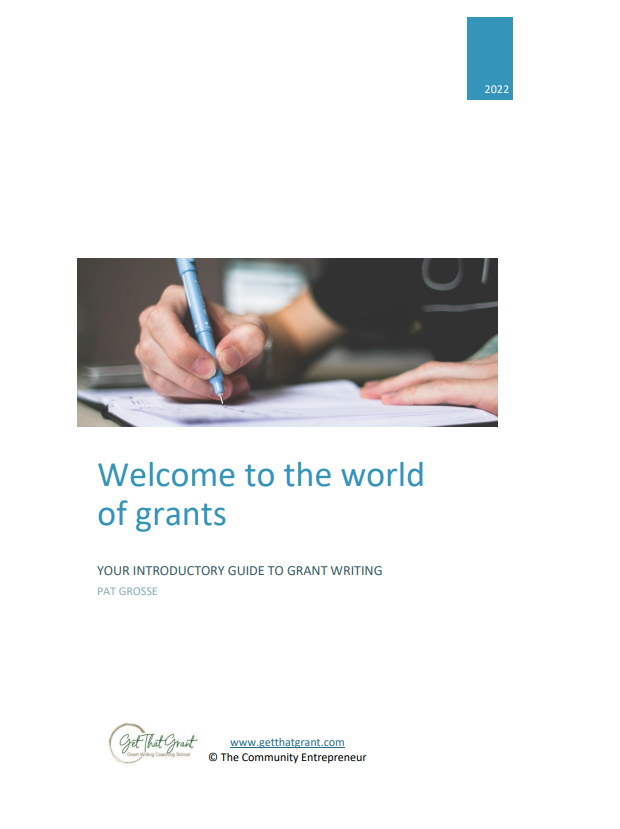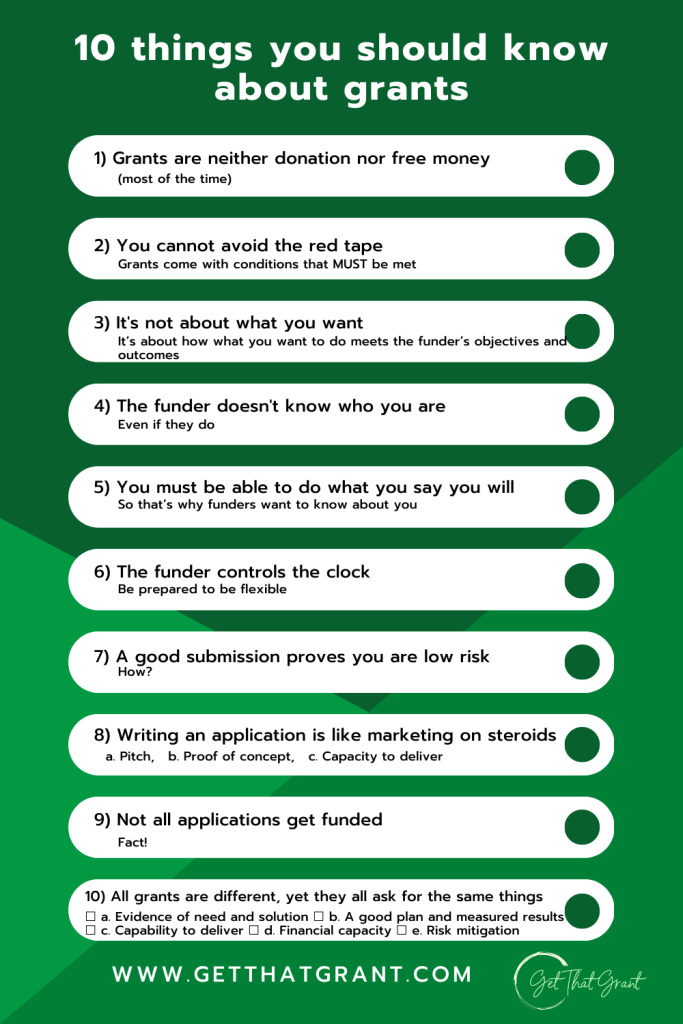Where to start looking for grants.
This section refers to grant seekers in Australia. For overseas visitors, there will be similar structures in place. It’s all about knowing they exist. We will update information to incorporate other countries over time.
There is over $90 bn worth of grants available in Australia alone. Where is this funding hiding out? In Exploring Grants work through where to start looking and options to support you on your grant finding journey.
Exploring Grants covers:

Where to find grants in Australia
If you are in another country, read anyway as this document includes clues as to how the system in your country may operate.
This guide includes:
- 10 different ways to source funding
- Links to Federal and State government grants
- Overview of what can be funded
- Five mistakes to look out for
- Frequently asked questions
DOWNLOAD and read Where to find grants in Australia and start
searching for potential grant opportunities today. Remember, many ‘closed’ grants may have future rounds. A must for anybody wanting to take up grant writing for their cause.
Setting up a Grants Calendar
If you are likely to be looking for a few grants, one option is to set up a grants calendar to reduce the risk of missing an important grant or deadline. Whilst you can take the time to explore and identify grants and grant cycles, this could be time-consuming and takes resources away from your everyday operations. For a fee, we can customise a grants calendar for your needs, To put together your customised calender, book an appointment now.
Three things you should know before you apply for a grant
Once I came across funded peak body agencies that were allocated the funding, and not required to account for what they spent the money on. Peak bodies are lead associations with membership organisations. There was no accountability. This arrangement did not last long, and it didn’t take long before they were required to submit what they would spend the money on, and complete a report afterwards.
Notwithstanding a few anomalies, grants are not donations. This is very important for a not-for-profit charity that’s looking for funding to support its activities in general. Donations are one aspect of fund-raising. Grants, on the other hand, are for defined projects that lead to change. Projects have a beginning, a middle and an end. If they don’t, then you’re looking for a donation. If your idea does have a beginning, a middle and an end date, then you can start looking for a grant.
Grants are not FREE
There’s no such thing as a free lunch, and likewise, there’s no such thing as a free grant. If it’s free, then it’s a donation. Grants come with legal strings. This is why, in 99% of cases, the contract is between two legal entities (more on this later). So be careful what you are signing up to.
A funding agreement will be a legally binding contract that spells out what you’ve agreed to supply as contractee in exchange for funding from the funder (contractor). It is not just limited to project activities, it also includes your relationship with the funder, conditions for marketing your relationship with them, and what insurances you must have in place to protect their interests.You have to do what you said you’d do, to achieve the outcomes you agreed. You may find a few wobbles on the way and have to make changes to steer the project back on course, but essentially the finishing line remains the same. Don’t take the money and run. There’s no escape. You will be required to account for how you spent the money, and most of the time, you will have to present evidence.If you don’t do what you said you’d do, then you may have to give the money back. This is not what the funder wants for many reasons, one being that the money might not go back to the program it came from and cannot be reallocated.
One of the biggest complaints |I hear, especially from organisations that get regular funding from government funders is about the amount of red tape they have to go through. They question whether it’s worth it, bemoaning the time it takes to complete progress reports, get their financials audited and any other requirements they have to fulfill. For a couple of years, there was an attempt in the department I worked in, to reduce red tape by making reporting as simple as possible. Too simple. Not only was the lack of detailed data hiding the risk of creative business practices, because the service providers were not honing their business case skills, this was having an effect on their capacity to apply for funding elsewhere.
The red tape is accountability. Fair and square. If you take the offer of funding, you must prove to the funder you can deliver. Hence, the funding agreement, insurances, structured and regular reporting, financial statements etc. You may even be required to attend briefings and participate in evaluation processes. Make sure there is somebody on the team who enjoys paperwork. They do exist. If you’re the creative ideas person, then yes you will struggle with administrivia. Who wouldn’t? Do not stress about the red tape. Get somebody else to take the pain away and leave you to do what you do best.
Take-away messages
- A grant must have a defined timeline – a beginning, a middle and an end. If it doesn’t then look for a donation, other fundraising venture, or a business loan.
- If you don’t do what you said you’d do, you will have to give the money back. This may lead to a black mark for future applications. If things are going wrong, you must let the funder know. It is in their interest as well as your own, to find a way around the problem. They much prefer a win-win for both parties.
- You can’t avoid the red tape. It’s there for a reason, not just to make your life difficult. Find someone who enjoys paperwork to keep the records up to date. Focus on why you applied for the funding in the first place.
Bonus

You have found a grant, maybe registered for a news service, or set up a grants calendar. You are now ready to apply. Are you ready to do the grant writing, or prefer to engage a grant writer? Or are you looking for training to become an adept grant writer? Select your preferred option below:

